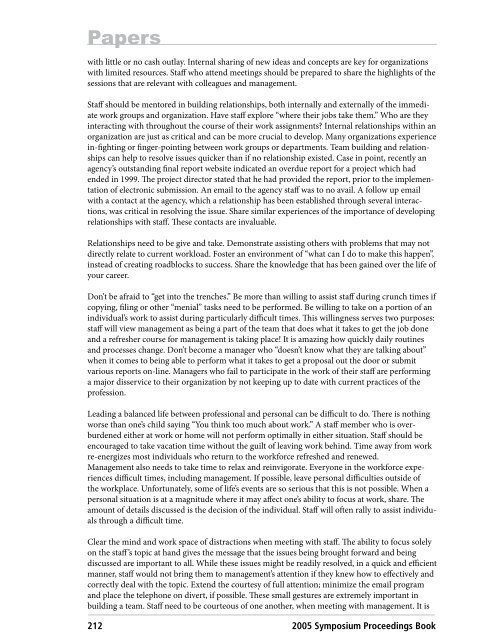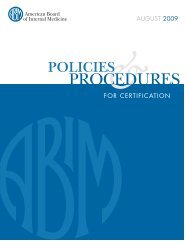The SRA Symposium - College of Medicine
The SRA Symposium - College of Medicine
The SRA Symposium - College of Medicine
Create successful ePaper yourself
Turn your PDF publications into a flip-book with our unique Google optimized e-Paper software.
Papers<br />
with little or no cash outlay. Internal sharing <strong>of</strong> new ideas and concepts are key for organizations<br />
with limited resources. Staff who attend meetings should be prepared to share the highlights <strong>of</strong> the<br />
sessions that are relevant with colleagues and management.<br />
Staff should be mentored in building relationships, both internally and externally <strong>of</strong> the immediate<br />
work groups and organization. Have staff explore “where their jobs take them.” Who are they<br />
interacting with throughout the course <strong>of</strong> their work assignments? Internal relationships within an<br />
organization are just as critical and can be more crucial to develop. Many organizations experience<br />
in-fighting or finger-pointing between work groups or departments. Team building and relationships<br />
can help to resolve issues quicker than if no relationship existed. Case in point, recently an<br />
agency’s outstanding final report website indicated an overdue report for a project which had<br />
ended in 1999. <strong>The</strong> project director stated that he had provided the report, prior to the implementation<br />
<strong>of</strong> electronic submission. An email to the agency staff was to no avail. A follow up email<br />
with a contact at the agency, which a relationship has been established through several interactions,<br />
was critical in resolving the issue. Share similar experiences <strong>of</strong> the importance <strong>of</strong> developing<br />
relationships with staff. <strong>The</strong>se contacts are invaluable.<br />
Relationships need to be give and take. Demonstrate assisting others with problems that may not<br />
directly relate to current workload. Foster an environment <strong>of</strong> “what can I do to make this happen”,<br />
instead <strong>of</strong> creating roadblocks to success. Share the knowledge that has been gained over the life <strong>of</strong><br />
your career.<br />
Don’t be afraid to “get into the trenches.” Be more than willing to assist staff during crunch times if<br />
copying, filing or other “menial” tasks need to be performed. Be willing to take on a portion <strong>of</strong> an<br />
individual’s work to assist during particularly difficult times. This willingness serves two purposes:<br />
staff will view management as being a part <strong>of</strong> the team that does what it takes to get the job done<br />
and a refresher course for management is taking place! It is amazing how quickly daily routines<br />
and processes change. Don’t become a manager who “doesn’t know what they are talking about”<br />
when it comes to being able to perform what it takes to get a proposal out the door or submit<br />
various reports on-line. Managers who fail to participate in the work <strong>of</strong> their staff are performing<br />
a major disservice to their organization by not keeping up to date with current practices <strong>of</strong> the<br />
pr<strong>of</strong>ession.<br />
Leading a balanced life between pr<strong>of</strong>essional and personal can be difficult to do. <strong>The</strong>re is nothing<br />
worse than one’s child saying “You think too much about work.” A staff member who is overburdened<br />
either at work or home will not perform optimally in either situation. Staff should be<br />
encouraged to take vacation time without the guilt <strong>of</strong> leaving work behind. Time away from work<br />
re-energizes most individuals who return to the workforce refreshed and renewed.<br />
Management also needs to take time to relax and reinvigorate. Everyone in the workforce experiences<br />
difficult times, including management. If possible, leave personal difficulties outside <strong>of</strong><br />
the workplace. Unfortunately, some <strong>of</strong> life’s events are so serious that this is not possible. When a<br />
personal situation is at a magnitude where it may affect one’s ability to focus at work, share. <strong>The</strong><br />
amount <strong>of</strong> details discussed is the decision <strong>of</strong> the individual. Staff will <strong>of</strong>ten rally to assist individuals<br />
through a difficult time.<br />
Clear the mind and work space <strong>of</strong> distractions when meeting with staff. <strong>The</strong> ability to focus solely<br />
on the staff ’s topic at hand gives the message that the issues being brought forward and being<br />
discussed are important to all. While these issues might be readily resolved, in a quick and efficient<br />
manner, staff would not bring them to management’s attention if they knew how to effectively and<br />
correctly deal with the topic. Extend the courtesy <strong>of</strong> full attention; minimize the email program<br />
and place the telephone on divert, if possible. <strong>The</strong>se small gestures are extremely important in<br />
building a team. Staff need to be courteous <strong>of</strong> one another, when meeting with management. It is<br />
212 2005 <strong>Symposium</strong> Proceedings Book

















